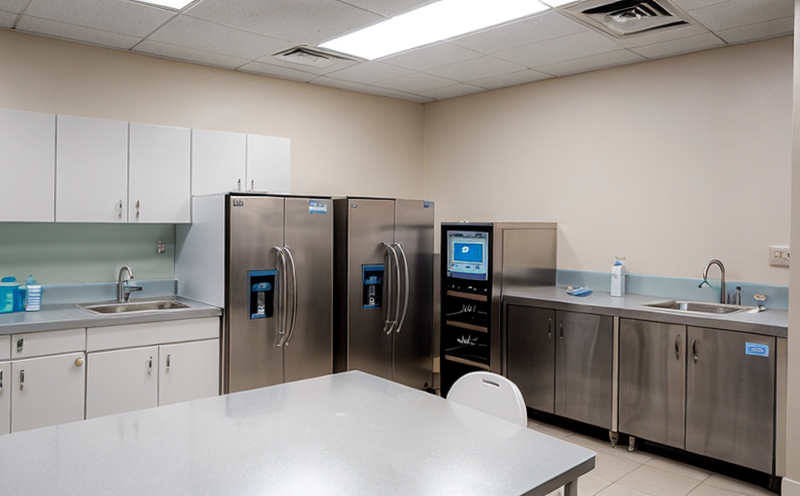ISO 11607-1 Sterile Barrier System (SBS) Design Qualification
The ISO 11607 series of standards, particularly the first part, ISO 11607-1:2019, focuses on the design qualification of sterile barrier systems intended for use in medical devices. This process is critical to ensure that the packaging materials and processes used are capable of maintaining sterility throughout the lifecycle of a device.
The sterile barrier system (SBS) serves as an integral part of the overall sterilization process, protecting the product from contamination during distribution, storage, and use. The design qualification ensures that the SBS can effectively maintain sterility under both static and dynamic conditions. This involves rigorous testing to evaluate the physical properties, chemical compatibility, and microbiological integrity of the barrier.
The test parameters for ISO 11607-1 are extensive and involve multiple phases including:
- Physical property testing such as tensile strength, puncture resistance, tear resistance, and seal strength.
- Microbiological challenge tests using various microbial species to assess the barrier's ability to prevent contamination.
- Chemical compatibility assessments to ensure that the materials do not interact adversely with other components of the medical device or its environment.
The process begins with a thorough evaluation of the material composition and manufacturing processes. This includes reviewing supplier data, conducting internal audits, and performing initial testing on samples taken from batches. Once this groundwork is laid, further testing is conducted under controlled conditions to simulate real-world scenarios that the SBS might encounter.
For physical property tests, tensile testers are used to measure the strength of the material in different orientations. Puncture resistance and tear resistance are tested using specialized equipment designed to replicate the forces encountered during packaging handling. Seal integrity is assessed through visual inspection and burst testing.
The microbiological challenge test is perhaps one of the most critical aspects. It involves exposing the SBS to a series of microbial strains, including spores (such as Bacillus atrophaeus), yeasts, and molds. The results are then compared against control samples that have not been exposed to these challenges. If the SBS can maintain sterility after exposure, it passes this phase.
Chemical compatibility tests ensure that the materials used in the SBS do not leach harmful substances into the device or its environment. These tests are conducted using analytical chemistry methods such as HPLC (High-Performance Liquid Chromatography) and GCMS (Gas Chromatography-Mass Spectrometry).
The testing process is meticulous, with each step contributing to a comprehensive evaluation of the SBS's ability to maintain sterility. The results are meticulously recorded and analyzed by our team of experts who ensure that all data meets or exceeds the stringent requirements set forth in ISO 11607-1.
Understanding the importance of this process is crucial for ensuring patient safety and compliance with international standards. By adhering to these rigorous tests, manufacturers can have confidence that their devices are safe and effective when used as intended.
Why It Matters
The ISO 11607-1 Sterile Barrier System Design Qualification is essential for ensuring the safety and efficacy of medical devices. By validating that the SBS can maintain sterility throughout its lifecycle, this process helps protect patients from potential contamination which could lead to infections or other harmful outcomes.
The importance of this cannot be overstated in light of recent recalls due to packaging failures leading to contaminated products reaching hospitals and clinics. Ensuring proper design qualification reduces these risks significantly. Additionally, compliance with ISO standards is often a requirement for regulatory approval, making this process not just important but mandatory for many medical device manufacturers.
The SBS plays a critical role in the overall sterilization process, acting as both a physical and chemical barrier against contaminants. By validating its design through rigorous testing, manufacturers can ensure that their devices meet these stringent requirements, thereby enhancing patient safety and trust in medical technology.
Benefits
The benefits of ISO 11607-1 Sterile Barrier System Design Qualification are numerous. Primarily, it ensures that the packaging used for medical devices is capable of maintaining sterility throughout its lifecycle. This not only enhances patient safety but also contributes to regulatory compliance.
- Enhanced patient safety by reducing the risk of post-operative infections or other complications caused by contaminated products.
- Increased confidence in product quality and reliability, leading to higher trust among healthcare providers and patients.
- Facilitates regulatory compliance through adherence to international standards such as ISO 11607-1.
In addition to these direct benefits, the process also helps manufacturers identify potential issues early in the development stage. This allows for corrective actions to be taken before production begins, saving time and resources. Furthermore, it ensures that all stakeholders involved in the product lifecycle are aligned with best practices.
Quality and Reliability Assurance
- Rigorous Testing: The process involves multiple phases of testing including physical property tests, microbiological challenge tests, and chemical compatibility assessments. Each phase is designed to evaluate different aspects of the SBS's performance.
- Data Analysis: All test results are carefully analyzed by our team of experts who ensure that all data meets or exceeds the stringent requirements set forth in ISO 11607-1.
- Continuous Improvement: The process is not static; it involves continuous monitoring and improvement to ensure that the SBS remains capable of maintaining sterility.





